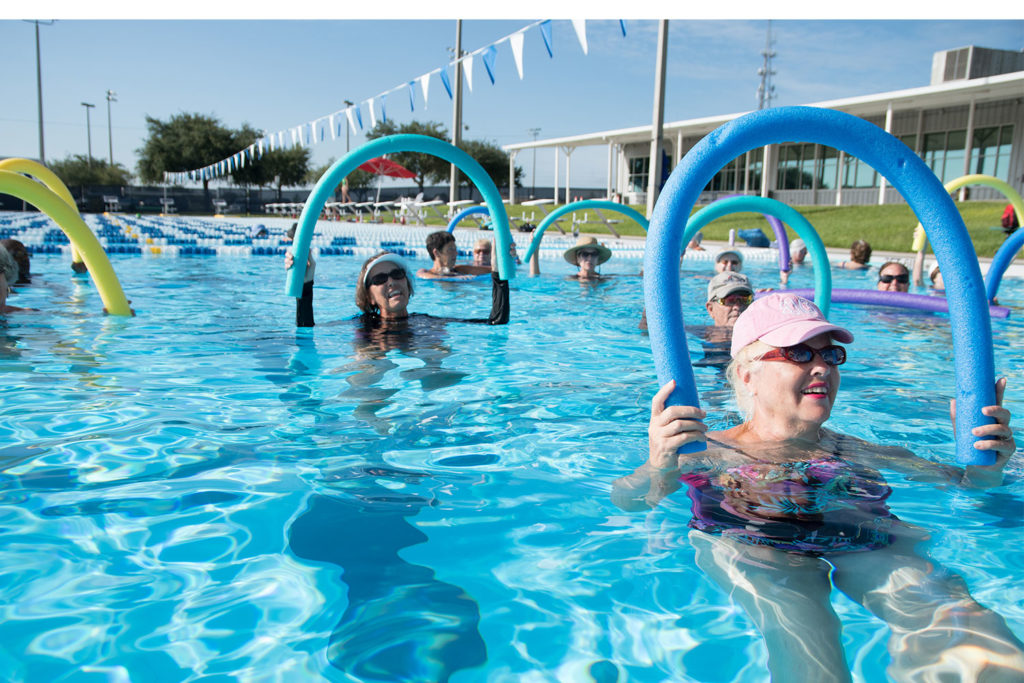

Dave Brummert, NSCA-CSCS, NASM-CPT
Exercise Specialist
When you swim on a regular basis, you’re doing your body all kinds of favors: you’re exercising in a variety of ways and you’re doing all them at the same time.
This means you improve your cardiovascular endurance while also building muscular strength (especially in the shoulders, back and core). You are increasing your overall coordination and strengthening the muscles you use to breathe. And because you are supporting almost none of your body weight while in the water, your joints are less stressed than they would be on solid ground running or cycling.
Swimming is also one of the only exercises you can do while recovering from surgery, when you have additional pain or injuries to accommodate for.
Give Your Heart a Workout
As with any form of cardiovascular exercise, you reap significant benefits to your long-term health by swimming regularly. It can make your heart work more efficiently by making it stronger. A stronger heart pumps blood more efficiently, meaning you’ll gain improved circulation throughout your body (even your brain!). And because our blood is how we receive nutrients to our bodies, swimming helps improve circulation and cardiac efficiency, reducing your risk of cardiovascular disease.
In addition to lowering your risk of heart disease and stroke, swimming can improve the number, size and efficiency of mitochondria you have. These are the energy-producing engines we all have inside our muscle cells. When they’re more efficient, other day-to-day tasks require less effort.
When you experience less stress on your heart, muscles and brain, overall longevity is the result. Some studies have discovered Masters swimmers who swim at least an hour a day for five days a week can have a biological age that is about 20 years less than their chronological age. That’s a longer way of saying swimming helps slow down the aging process.
Along with the possibility of building more muscle, you can stave off the worst effects of age-related diseases (like sarcopenia) as long as you’re also including a well-balanced diet.
No Age Limit
Because very minimal effort is required to move your body through water, swimming is a welcome opportunity for people of all ages to improve their fitness. People of all fitness levels swim, each for different reasons.
For example, athletes can use pool running to stay fit when they have a lower body injury. Children can improve their coordination; the pressure of the water on their skin provides feedback to the brain, letting it know where they are in space. Called proprioception, this is a huge benefit to anyone who works out in the water.
Older individuals at risk of falling can improve their strength and balance without fear of getting injured while in the water. Rehabilitation patients can work toward preventing the atrophy of their muscles while they work back to full strength. Even though you have to support less of your body weight while in the water, you can still get a great workout because of the resistance provided.
Treading Water Helps Too
And remember, to benefit from swimming as an exercise, you don’t need to swim thousands of meters of repetitive laps. Simply walking through the water can provide some people with enough stimuli to improve themselves. For others, there are classes like Aqua Zumba® and aerobics, the latter using foam weights to increase the resistance of moving in the water. And by treading water, you do far more than just challenge your cardiovascular system: It’s a fun way to relieve stress and even a way of bonding with friends or family. For the more adventurous, different plyometric exercises like jumping in the pool or running underwater with weights can help increase strength and power without the danger of overtraining your body.
As with any sport or activity that you may be new to, please consult a qualified professional for coaching assistance or lessons when you start. It helps you build a good foundation. One word of caution, though: Wherever you choose to swim, do so safely, never doing so alone and always near a lifeguard.
